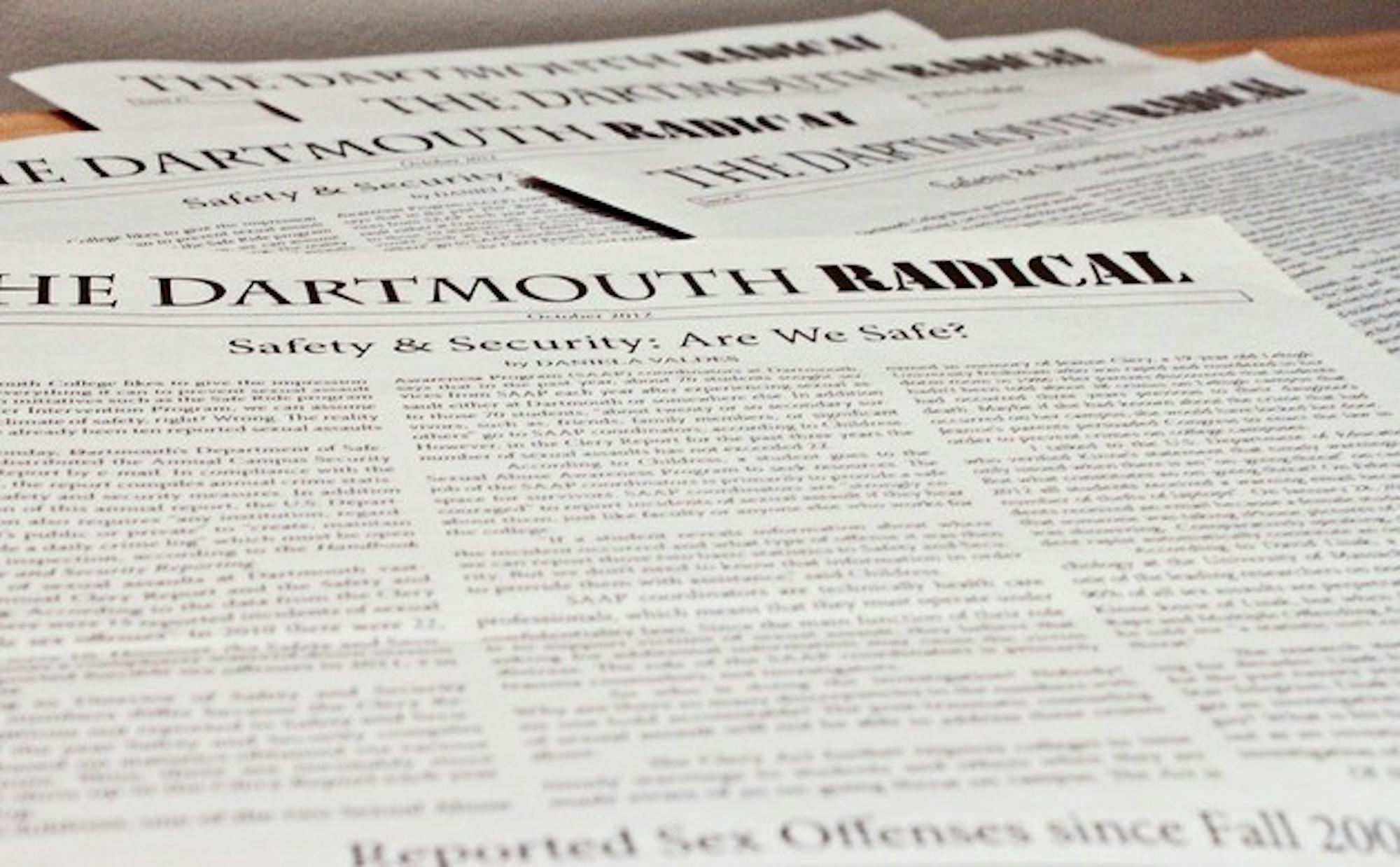Founded by Lily Brown '15, Janet Kim '13, Eli Lichtenstein '13, Allison Puglisi '15, Karenina Rojas '13, Daniela Valdes '13 and Anna Winham '14, the eight-page publication will run poems, satire pieces and news stories from a progressive perspective. The founders began discussing the possibility of creating a newspaper last summer and sought alumni input, according to Valdes.
Earlier in the term, the Council on Student Organizations approved The Radical as an official student group and subsequently granted it College funding, at which point the founding student staff members contacted English professor and journalist Jeffrey Sharlet to serve as the group's advisor.
The word "radical" was chosen for the publication's name in an attempt to embrace the implications of the term which often carries negative connotations and discuss issues like equality, justice and labor, staff members said.
"In my experience at Dartmouth there's a dearth of progressive conversation in that The Dartmouth Review is fairly far right and The Dartmouth itself seems to not take a stance on whether or not the status quo should remain the same and thus reinforces the status quo," Winham, the organization's treasurer, said. "The Radical is trying to hold a conversation that maintains that the status quo is not acceptable and needs to change, and the debate of the dialogue is how it needs to change."
Other leftist campus publications, such as The Dartmouth Independent and The Free Press, have largely stopped publishing, according to Rojas, who noted that The Radical will need to recruit freshmen and sophomores to continue to publish in the future. Currently, the publication's staff includes approximately 20 people, and membership has grown significantly since the first issue and last week's first staff meeting.
"I think that we want to create some sort of institutional memory for leftist activists on this campus," Valdes said.
The Radical publishes stories that its staff members see as necessary to bring about social justice, including potentially inflammatory articles like the recent front-page article on sexual assault, Valdes said.
Edwin Yung '15 said the success of campus publications like The Radical and The Review often depends on the controversy they can spur.
"That is how they can get more attention and a wider audience," Yung said.
Reader Sumayya Younus '15 said she appreciated the first issue's content, which she said did not make unsubstantiated claims and drew on real data when necessary. Younus said she particularly enjoyed reading a piece by Mayowa Willoughby '14 titled "A Letter to the Christian Bodies on Dartmouth Campus," which explored the relationship between social justice and Christianity.
"It talked about things no one else has talked about," Younus said. "It presents a side which no one else is willing to put out, which I think we need."
Former Free Press staffer Alice Lloyd '13 said that the Radical can only have an impact if it acknowledges its limits as a publication.
"The DFP succeeded where The Dartmouth Radical and the rest of the left fail it did not take itself too seriously," she said in an email. "If this new liberal progressive paper wants to have an impact on this campus, it needs to grow out of its soppy gravitas phase."
Valdes initially hoped that articles exploring campus issues could place increased pressure on the administration by exposing wrongdoings and inspiring intellectual discussion, she said.
Winham said that working with The Radical enables her to provoke dialogue and raise awareness about issues that are otherwise unreported.
While its leaders may not choose to officially involve the organization in political activities, Rojas said she expects that members will engage with other groups for that purpose. A number of current members have been and continue to be involved with other leftist political organizations on campus, including Occupy Dartmouth and the People's Coalition, according to Lichtenstein.
Sharlet, who covered the Occupy movement as a journalist and teaches creative writing, said he agreed to advise The Radical because he believes in having a variety of publications on campus to create dialogue and expose multiple viewpoints. Although he is personally sympathetic to leftist causes, Sharlet said he thinks the efforts of all of the College's student publications are worthwhile.
"I root for ideas, so I'm glad to support all these publications," he said.
After the publication of the first issue, Valdes said she was surprised by the Dartmouth community's positive reactions.
"I got tons of positive feedback from professors, tons of really positive remarks from students," she said.
While the paper's structure includes staff writers, editors and other positions, Valdes said that the staff members collaborate democratically to encourage participation and intellectual debate. The Radical's loose form, which blends news with poems and satire, enables writers to use their own specific styles, according to Rojas.
The staff hopes to publish another issue by next week, Valdes said.
Staff members of The Dartmouth Review declined to comment.




